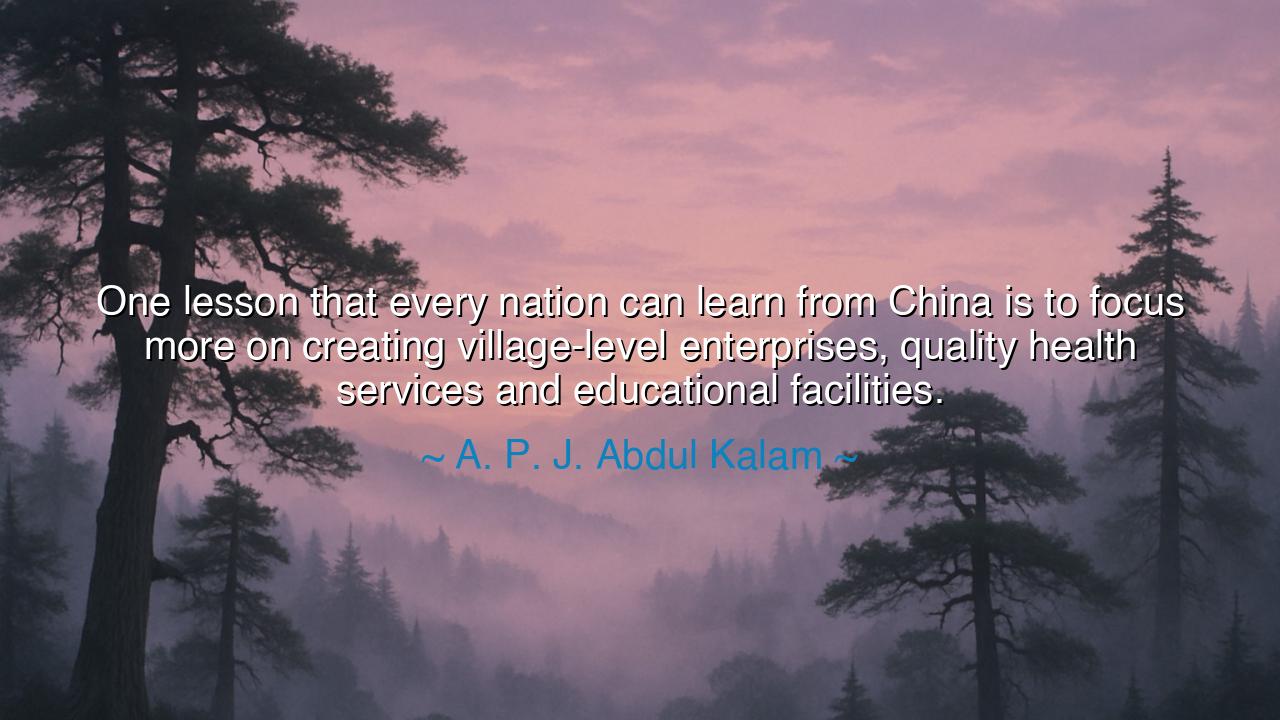
One lesson that every nation can learn from China is to focus
One lesson that every nation can learn from China is to focus more on creating village-level enterprises, quality health services and educational facilities.






“One lesson that every nation can learn from China is to focus more on creating village-level enterprises, quality health services, and educational facilities.” — A. P. J. Abdul Kalam
Listen, O seeker of wisdom, to the words of A. P. J. Abdul Kalam, the People’s President of India, a man who dreamed not of power, but of progress born from compassion. In this saying, he unveils a truth both simple and profound: that the strength of a nation does not lie in its towering cities or its vast armies, but in the well-being of its villages — in the dignity of its smallest communities, where the roots of civilization are planted. Kalam’s words echo the eternal wisdom of the ancients: that a nation is only as strong as the hearts of its common people, and that true prosperity is measured not in gold or steel, but in education, health, and enterprise.
The origin of this quote lies in Kalam’s lifelong vision of inclusive development. He studied the rise of China, a nation that, through decades of effort, transformed its rural lands from poverty into productivity. China’s leaders did not build only cities of glass and metal; they built industries in the villages, schools in the fields, and clinics beside the rice paddies. They brought progress to the doorstep of the farmer and the laborer, ensuring that every citizen could share in the nation’s destiny. Kalam, seeing this, urged all nations — especially his beloved India — to follow such a path: to empower the villages, where the true spirit of humanity resides.
In this teaching, Kalam reminds us of a timeless truth — that development without inclusion is decay disguised as progress. When only the cities flourish while the countryside languishes, the soul of a nation begins to fracture. He understood that the farmer who tills the soil, the teacher in the small school, the nurse in the rural clinic — these are the pillars of lasting prosperity. For when villages have enterprises, they create wealth; when they have education, they create wisdom; when they have health, they create endurance. And when these three forces combine, they give birth to harmony — a balance between growth and humanity, between the needs of the body and the dreams of the spirit.
Consider the story of Verghese Kurien, the father of India’s White Revolution. He brought milk cooperatives to the smallest villages of Gujarat, empowering farmers who once lived in hardship. Through collective effort and local enterprise, India rose to become the world’s largest milk producer. It was not done by foreign corporations or mighty cities, but by the humble work of villagers united by purpose. This is the living example of Kalam’s wisdom — that great nations are built from the ground up, not from the top down. Every enterprise born in a village is a flame of dignity, and every educated child there is a beacon of hope.
The lesson in Kalam’s words extends beyond geography; it touches the soul of governance itself. For a state that forgets its villages forgets its humanity. Technology, wealth, and power are but hollow achievements if they do not uplift the many who dwell far from the centers of privilege. The true measure of leadership lies in the reach of compassion, not the scale of monuments. China’s success, in Kalam’s eyes, was not merely in its growth, but in its strategic compassion — its recognition that national strength begins with rural empowerment. This is what every nation, every leader, every citizen must learn: to build not only roads and cities, but communities of care.
Thus, O listener, let this truth guide you as it guided the great teacher himself: never despise small beginnings. Whether in governance, in business, or in life, build from the roots upward. Support local enterprises, cherish education, and nurture health — for these are not mere policies, but the lifeblood of civilization. Visit your village, your neighborhood, your forgotten corner of the world, and ask: “What can I build here? Whom can I teach? Whom can I heal?” Such questions, though humble, are the sparks that light the torch of progress.
In the end, A. P. J. Abdul Kalam’s vision is not only a roadmap for nations, but a moral call to humanity. He teaches us that greatness is not achieved through conquest, but through care — through the steady, patient lifting of the poor, the sick, and the uneducated. When every village becomes a center of opportunity, when every child holds a book, when every home has health and dignity, then the nation stands not as a collection of territories, but as a family bound by shared purpose. And in that day, we shall see that the mightiest power on Earth is not the one that conquers others, but the one that uplifts its own.






AAdministratorAdministrator
Welcome, honored guests. Please leave a comment, we will respond soon